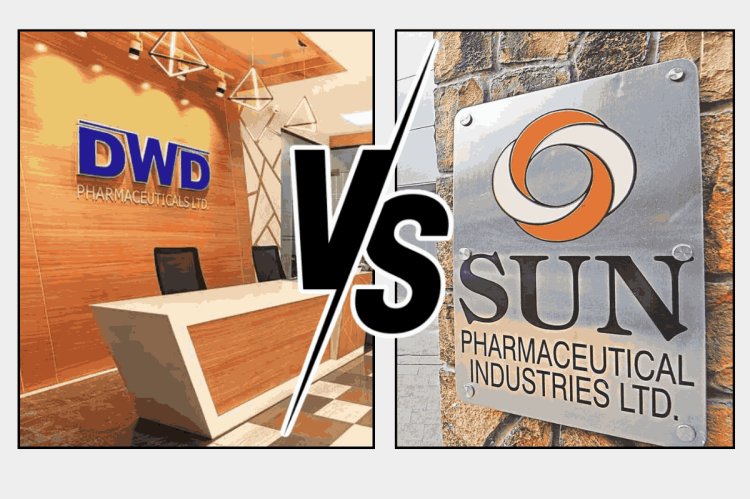Sun Pharmaceutical Industries Ltd. v. DWD Pharmaceuticals Ltd
In a trademark infringement case between Sony and M/s. Sony Tours and Travels, the court issued an ad-interim ex-parte injunction in favor of Sony, prohibiting the defendant from using the mark 'FOLZEST' for medicinal preparations. Despite the plaintiff's concealment of material facts, the court upheld the injunction due to the deceptive similarity between the marks and the potential for confusion in the pharmaceutical market. The decision underscores the importance of protecting public interest and preventing confusion in the pharmaceutical industry.

Sun Pharmaceutical Industries Ltd. v. DWD Pharmaceuticals Ltd
SCC Online Del 4015,
Decided on 22-11-2022
Background
The plaintiff's predecessor-in-interest, Ranbaxy Laboratories Ltd., created and registered the trademark 'FORZEST' in 2003 for pharmaceutical and medicinal preparations for human and veterinary use. The plaintiff became the subsequent proprietor of this trademark. In 2022, the plaintiff discovered that the defendant had applied for the mark 'FOLZEST' on a proposed to be used basis in Class 5, which was immediately opposed by the plaintiff. The plaintiff's trademark 'FORZEST' was cited in the Examination Report against the defendant's trademark application, and the defendant claimed that their mark was different from the plaintiff's mark. The defendant also claimed that they were the registered proprietor of various 'ZEST' trademarks since 1983. The defendant's trademark application was pending consideration before the Trade Marks Registry. The plaintiff argued that the defendant's adoption of a similar mark constituted trademark infringement, passing off, and unfair competition. As a result, the Court issued an ad-interim ex-parte order of injunction on May 19, 2022, prohibiting the defendant from selling its medicinal preparations under the 'FOLZEST' mark. Later, the defendant claimed that the plaintiff had obtained the injunction by concealing important facts. The defendant argued that the plaintiff was aware of both the registration of the 'ZEST' mark and the other marks registered and used by the defendant. The plaintiff had previously applied for the registration of the 'EXEZEST' mark, which the defendant opposed in 2009. Additionally, the plaintiff applied for the registration of the 'TRIOLMEZEST' mark, which was opposed by the defendant in 2014 on the grounds that the defendant was the registered proprietor of the 'ZEST' family of marks.
Submissions on behalf of the Plaintiff
The plaintiff's counsel argued that while the marks of the plaintiff and the defendant may appear similar, their medicinal preparations were different. The plaintiff's medicinal preparation was intended for treating erectile dysfunction in men, while the defendant's medicinal preparation was a multivitamin for pregnant women that aimed to lower the risk of pre-term births. The counsel highlighted that any confusion between the two marks could result in wrongful consumption. Additionally, the defendant could not claim exclusive rights over the word 'ZEST' since there were third parties in the market using the same word.
Submissions on behalf of the Defendant
The defendant argued that the plaintiff had a duty to disclose certain facts which would have disproved the plaintiff's claim that they only learned of the defendant's use of the mark 'FOLZEST' in 2022. These facts would have shown that the defendant had multiple registrations including the word 'ZEST'. As a result, the defendant's counsel argued that the interim injunction order granted by the court should be set aside due to the plaintiff's misrepresentation, concealment, and suppression of material information and documents.
Court Decision
The court ruled that the plaintiff had concealed important and material facts that should have been disclosed upfront in the plaint. The plaintiff's failure to disclose such facts misled the court and had a bearing on the relief of an ad-interim ex-parte injunction in favour of the plaintiff. The court held that the plaintiff had acted with mala fide intent to deceive the court by concealing material facts. The court observed that the mark 'FORZEST' of the plaintiff was deceptively similar to the mark 'FOLZEST' of the defendant. Moreover, the medicine of the plaintiff was for treating erectile dysfunction in men, while the medicinal preparation of the defendant was a multivitamin for pregnant women for lowering the risk of pre-term births. The court relied on Cadila Health Care Ltd. v. Cadila Pharmaceuticals Ltd. and Novartis AG v. Crest Pharma Pvt. Ltd. and held that in medicinal goods, the right of not only the private litigants but also public interest has to be kept in mind. Even a remote chance of deception or confusion arising because of similarity in the marks should be avoided and prevented. Therefore, despite the concealment and misstatement of the plaintiff, the plaintiff was entitled to an ad-interim relief if the marks of the medicinal goods are deceptively similar to each other.
The court held that the plaintiff would still be in favour of granting an ad-interim injunction against the defendant for the following reasons: Firstly, the plaintiff through its predecessor-in-interest had been the registered proprietor of the mark 'FORZEST' since 2003. Secondly, the said mark has been used by the plaintiff/its predecessor-in-interest since 2003 and had substantial sales. Thirdly, though the defendant had a 'ZEST' family of marks, it had started using the impugned mark 'FOLZEST' only in June 2021/May 2022. Fourthly, use of the medicine of the plaintiff and the defendant were different. Finally, the two marks were deceptively similar, and any confusion in the same could lead to disastrous consequences. Therefore, the court held that an ad-interim ex-parte order of injunction stands confirmed during the pendency of the present suit.
Court Analysis
The court upheld the ad-interim ex-parte order of injunction in favour of the plaintiff despite their concealing of material facts. The decision was based on the potential for confusion in the market and the need to protect public interest in the pharmaceutical industry. The court emphasized the importance of preventing any chance of deception or confusion and balanced the rights of private litigants with the broader public interest.












